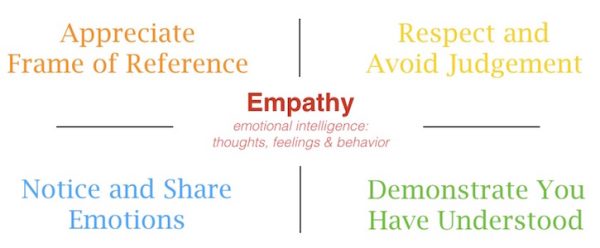Entrepreneurial Empathy Founders Set the Character and Ethics of the New Venture by the Way They Behave
Entrepreneurial Empathy: The word ‘reveal’ sounds either like showing off, or showing private stuff. Good entrepreneurs who habitually reveal themselves by the way they behave—to show who they really are, and what their venture represents. Good entrepreneurs are also good listeners. They also validate the position of whomever they interact with.
The combination of revealing, listening and validating demonstrate entrepreneurial empathy, or simply empathy in general. Business schools don’t generally teach empathy, far less entrepreneurial empathy, it’s not something you learn from a book, but you can cultivate it. It may be tough if it’s not your natural way, but the results will startle you
empathy, far less entrepreneurial empathy, it’s not something you learn from a book, but you can cultivate it. It may be tough if it’s not your natural way, but the results will startle you
Empathy in the Workplace: A Tool for Effective Leadership, a white paper from the Center for Creative Leadership is well worth reading. This short piece makes clear the advantages; ones that can be applied in the creation of new ventures.
Bowler Hat and Rolled Umbrella
When I first went to work in an office in 1961, after short careers as a soldier, farm laborer, post and rail fence builder, second-hand book buyer, and freelance journalist, my father’s advice was that I should wear a detached stiff collar with my white shirt, a bowler hat and carry a rolled umbrella (I’m a Brit by origin) if I was to be taken seriously. He believed that there was a proper way to behave at work. In other words, I should leave my personality at home and take on the persona of an office worker.
It was not long before I was wearing soft collared colored shirts, sporting a fedora and carrying a man-purse. This was not to make a statement, but just to behave as me, rather than a fictional ‘businessman’ character. The point of the story is that I discovered that I was bad at impersonation, and that my colleagues were happy to accept who I was. Of course, my work still needed to be exemplary!
Vision and Values Statements Risk Being Wishful Thinking
The fad for writing statements of vision and values, is great, except that so many times they are statements of wishful thinking (have a look at Vision Statement and/or Startup Statements of Intent). A claim like “Customers First”, you know really translates into ‘sales first, customers pay, we win’. As the founder of a new venture, this is a risk you cannot afford. Your claims have to be demonstrated by your actions.
The advantage you have as an entrepreneur, is that you start with a clean sheet. There is no bad reputation to overcome. The new venture has no reputation. The moment you’re open for business, your reputation will start to exist, for good or ill. If you start by demonstrating entrepreneurial empathy in all that you do, you are more likely to gain a good reputation… that is of course, if all the other aspects of the business are as good!
Vulnerability is a Benefit
However you arrange things, your new business will have three basic functions: operations, finance and marketing. Sorry, human resources or IT specialists, you come later. You cannot be a specialist in all three areas. The founder benefits from inexperience, and vulnerability—yes benefits from vulnerability. Hiding skill shortage or bragging are likely to let you down. Being open and honest about your weakness or fears will only demonstrate that you are human.
The frailty will bring support and encouragement—and show entrepreneurial empathy, encouraging openness and reflected behaviors from your colleagues. This similar behavior pattern will have a ripple effect through the organization.
Revealing, Listening and Validating
So, you reveal yourself, and as the business become established, you also have to demonstrate that you listen and show entrepreneurial empathy. That sounds simple, but it also requires skill. When you hear, make sure you’ve heard right by interpreting back to the speaker what you think you’ve heard. Then there is an opportunity for correcting any misinterpretation that may have occurred. When you are doing that, ask open-ended questions, not ones with only a yes/no answer (closed questions).
Validate what you’ve heard, by saying something like, “I understand how that must make things difficult for you.” The more you take these steps of revealing, empathizing and validating, the more they will become natural to you. The more you behave this way, the more this will become the normal practice among your colleagues. The actions and behaviors of any business define how it is perceived outside—by all stakeholders.
The revealing, listening and validating, or entrepreneurial empathy, has to be applied in all three basic functions, too. Not just in your personal interactions at work. Think about your interactions with suppliers, and of above all with customers. How often have you been frustrated in interactions with customer service agents telling you that they cannot help you because of ‘company policy’? I particularly fume when such a person says, ‘I can’t do that, it’s above my pay grade’.
Your new venture will fly faster and higher if everyone in it demonstrates empathy, but it starts with you. You may benefit from reading my post on Being an Entrepreneur.






